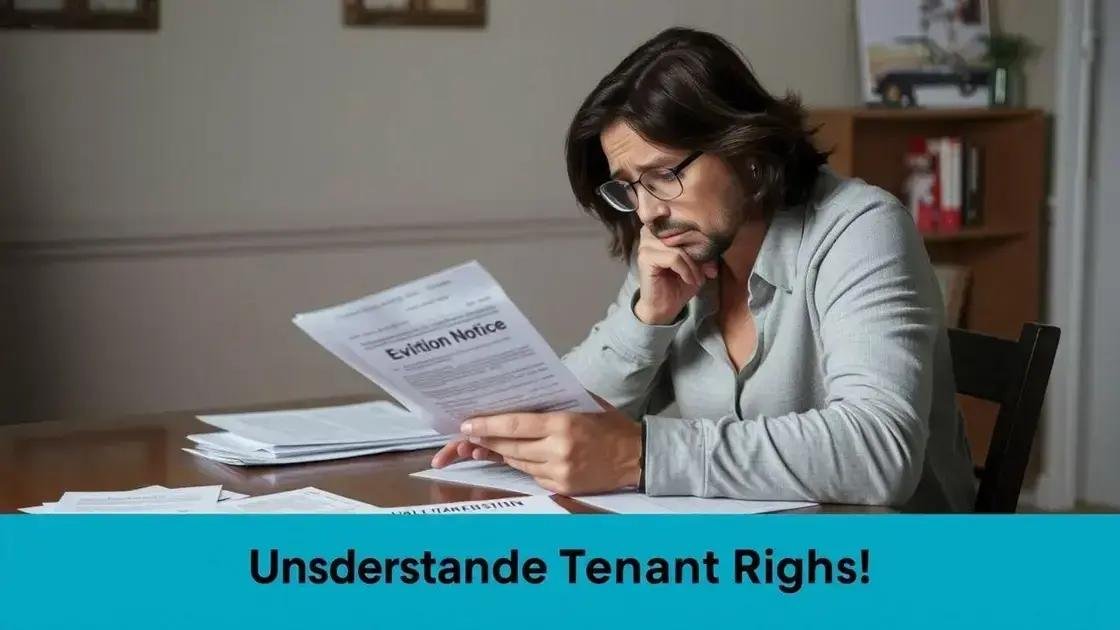Tenant eviction protection refers to laws and services that prevent wrongful evictions, ensuring tenants receive appropriate notice and have the right to contest evictions in court while providing resources for legal and financial assistance.
Tenant eviction protection plays a vital role in securing housing stability for renters. Have you ever wondered how these protections could impact your situation? In this article, we’ll explore important aspects that every tenant should know.
Understanding tenant eviction protection laws
Understanding tenant eviction protection laws is essential for every renter. These laws can vary widely by state, so knowing your rights can help you feel more secure in your home.
What Are Tenant Eviction Protection Laws?
Tenant eviction protection laws are designed to prevent wrongful or unfair evictions. They provide a legal framework that protects tenants from being removed from their homes without due process. This means that landlords often must follow specific procedures before they can evict a tenant.
Key Rights Under These Laws
Many state laws include several key rights for tenants:
- The right to receive proper notice before eviction.
- The right to contest an eviction in court.
- Protection against retaliatory evictions when tenants exercise their rights.
- The right to remain in their home if they are working on a rental agreement dispute.
Having these rights ensures that tenants are not evicted without warning or justification. It’s important for renters to understand these protections so they can stand up for themselves.
Additionally, tenant eviction protection laws often require landlords to provide approved reasons for eviction, such as non-payment of rent or lease violations. Tenants have the right to dispute these claims in court, allowing them a chance to explain their side.
How to Stay Informed
Staying informed about changes in eviction laws can be beneficial. Here are some tips:
- Check local housing authority websites for updates.
- Follow tenant advocacy groups on social media.
- Attend community meetings focused on housing issues.
Understanding your rights and responsibilities as a tenant will empower you to make informed decisions about your living situation. When tenants know their rights, they can better advocate for themselves against unfair practices.
In summary, being aware of tenant eviction protection laws equips renters with the knowledge necessary to protect themselves and their families. Seeking legal advice when in doubt can further enhance a tenant’s protection against eviction.
Key benefits of eviction protection for tenants
The key benefits of eviction protection for tenants play a significant role in ensuring housing security. Knowing these advantages can empower renters to advocate for their rights.
Enhanced Security
One of the main benefits is enhanced security against sudden evictions. This protection allows tenants to remain in their homes even during financial difficulties. Having a stable living situation can reduce stress and improve overall well-being.
Legal Support
Eviction protection often includes access to legal resources. Tenants can receive assistance understanding their rights and can get help navigating legal proceedings if necessary. This support can make a crucial difference during challenging times.
Additionally, knowing your rights helps prevent unlawful eviction attempts. With tenant eviction protection, renters can contest wrongful evictions and remain in their homes while addressing disputes with landlords.
Financial Assistance
Several programs offer financial assistance alongside eviction protections. These resources can help cover unpaid rent and ensure that tenants do not lose their homes due to temporary financial struggles. Many local and state organizations provide funds to assist tenants in crisis.
- Programs that prevent eviction through rental assistance.
- Community resources offering budgeting and financial planning advice.
- Legal aid organizations that help tenants apply for support.
Taking advantage of these services can ensure that tenants avoid the devastating impact of eviction.
Ultimately, understanding the key benefits of eviction protection helps tenants protect themselves and their families. Having these safeguards in place is crucial for maintaining stability and peace of mind.
Common misconceptions about eviction protection

There are many common misconceptions about eviction protection that can confuse tenants. Understanding the truth behind these myths is crucial for renters to fully utilize their rights.
Myth 1: Eviction Protection Guarantees No Eviction
Some people believe that having eviction protection means they cannot be evicted at all. However, this is not true. Eviction protection provides tenants with legal safeguards, but it does not guarantee that evictions cannot happen. Landlords can still evict tenants for valid reasons, such as not paying rent.
Myth 2: Only Low-Income Tenants Qualify
Another misconception is that only low-income tenants are eligible for eviction protection programs. In reality, many protections are available to all tenants, regardless of income level. Programs can vary based on location but often include various support for different income brackets.
This misunderstanding can discourage tenants from seeking help when they need it most. Knowing that a wide range of renters can benefit from eviction protection encourages people to explore their options.
Myth 3: Eviction Protection Is the Same Everywhere
Many assume that eviction protection laws are uniform across the country. However, laws differ greatly from state to state and sometimes even within local jurisdictions. Tenants must familiarize themselves with their specific local laws to understand the protections available to them.
- Check local housing authority websites.
- Contact local tenant advocacy groups.
- Seek legal assistance to understand your rights.
By being informed about local regulations, tenants can navigate the eviction process more effectively.
Myth 4: Tenants Can’t Fight an Eviction
Some renters believe that once an eviction notice is served, they cannot fight back. This is false. Tenants have the right to contest an eviction in court. They can present their case and provide evidence to support their position. Having access to legal resources can help in this process.
Understanding the truth about these common misconceptions empowers tenants to take action if they face eviction. Knowledge of their rights creates a stronger position for renters in any dispute with landlords.
How to apply for eviction protection services
Applying for eviction protection services can seem overwhelming, but it is a crucial step for tenants facing housing insecurity. Knowing the right process can make it easier to gain the help you need.
Step 1: Research Local Services
Start by researching local services that offer eviction protection. Many cities have specific organizations dedicated to helping tenants. Look for government programs and non-profit agencies that provide resources.
- Visit local housing authority websites for information.
- Search for tenant advocacy groups in your area.
- Check community centers for listings of available resources.
Gather a list of organizations that can assist you in applying for eviction protection.
Step 2: Gather Necessary Documentation
When applying for services, it’s essential to have the right documents. Common documents include:
- Proof of income, such as pay stubs or bank statements.
- Rental agreement or lease contract.
- Notice of eviction or any correspondence from your landlord.
- Identification, like a driver’s license or state ID.
Having these documents handy can speed up the application process and ensure you meet the eligibility requirements.
Step 3: Submit Your Application
Once you’ve identified the services available and gathered your documents, it’s time to submit your application. Depending on the organization, applications may be accepted online, via mail, or in person. Follow the specific instructions provided by the service.
During this process, be honest and thorough in your application. Incomplete applications can lead to delays or denials. If you encounter difficulties, don’t hesitate to reach out to the organization for assistance.
Step 4: Follow Up
After submitting your application, it’s important to follow up. Contact the organization to check the status of your application. This helps ensure that your case is being processed. Knowing where you stand can alleviate anxiety and allow you to plan your next steps.
Applying for eviction protection services is a vital process that can safeguard your housing rights. By being proactive and informed, you can navigate this process more effectively and seek the support you need.
What to do if eviction protection fails
If eviction protection fails, it’s important to understand the next steps you can take to safeguard your rights and secure your housing. This situation can be stressful, but having a plan can help.
Step 1: Assess Your Situation
The first thing to do is assess your current housing situation. Gather all the information related to your eviction. Look for any notices you received from your landlord, court documents, or communication regarding your case. Understanding your situation helps clarify your options.
Step 2: Seek Legal Advice
Consulting a lawyer who specializes in tenant rights can provide valuable guidance. Legal professionals can help you understand your case and explore possible defenses against eviction. You can also reach out to local legal aid organizations that assist tenants in need.
- Contact nonprofit legal services for assistance.
- Join tenant advocacy groups for support.
- Attend workshops or informational sessions about tenant rights.
Having expert advice can empower you to challenge the eviction or negotiate with your landlord.
Step 3: Explore Financial Assistance
If eviction protection has failed due to financial issues, explore available resources for financial assistance. Many local organizations provide help with rent, utilities, and other expenses. Applying for these funds can help bridge the gap and prevent eviction.
Research local charities, government programs, and community resources. Being proactive in seeking financial help can make a significant difference.
Step 4: Know Your Rights During the Eviction Process
Even if eviction protection fails, you still have rights during the eviction process. Familiarize yourself with local laws regarding eviction proceedings, including the proper process landlords must follow. This knowledge can help you ensure that your rights are respected.
For instance, landlords usually cannot forcibly remove you without a court order. If they attempt to do so, you can contact the authorities for assistance.
Being informed about what to expect during an eviction process can help tenants respond effectively and reduce anxiety.
In summary, knowing what to do if eviction protection fails allows tenants to take proactive steps. By assessing your situation, seeking legal advice, exploring financial assistance, and understanding your rights, you can navigate this challenging period with more confidence.
FAQ – Frequently Asked Questions about Tenant Eviction Protection
What is tenant eviction protection?
Tenant eviction protection refers to laws and programs that help safeguard renters from wrongful evictions and provide them with certain rights before a landlord can evict them.
Who qualifies for eviction protection services?
Eviction protection services are generally available to all tenants, regardless of income level, but eligibility may vary based on local laws and programs.
What should I do if my eviction protection fails?
If eviction protection fails, assess your situation, seek legal advice, explore financial assistance, and ensure you understand your rights during the eviction process.
How can I apply for eviction protection services?
You can apply for eviction protection services by researching local organizations, gathering necessary documentation, and submitting your application according to their guidelines.

